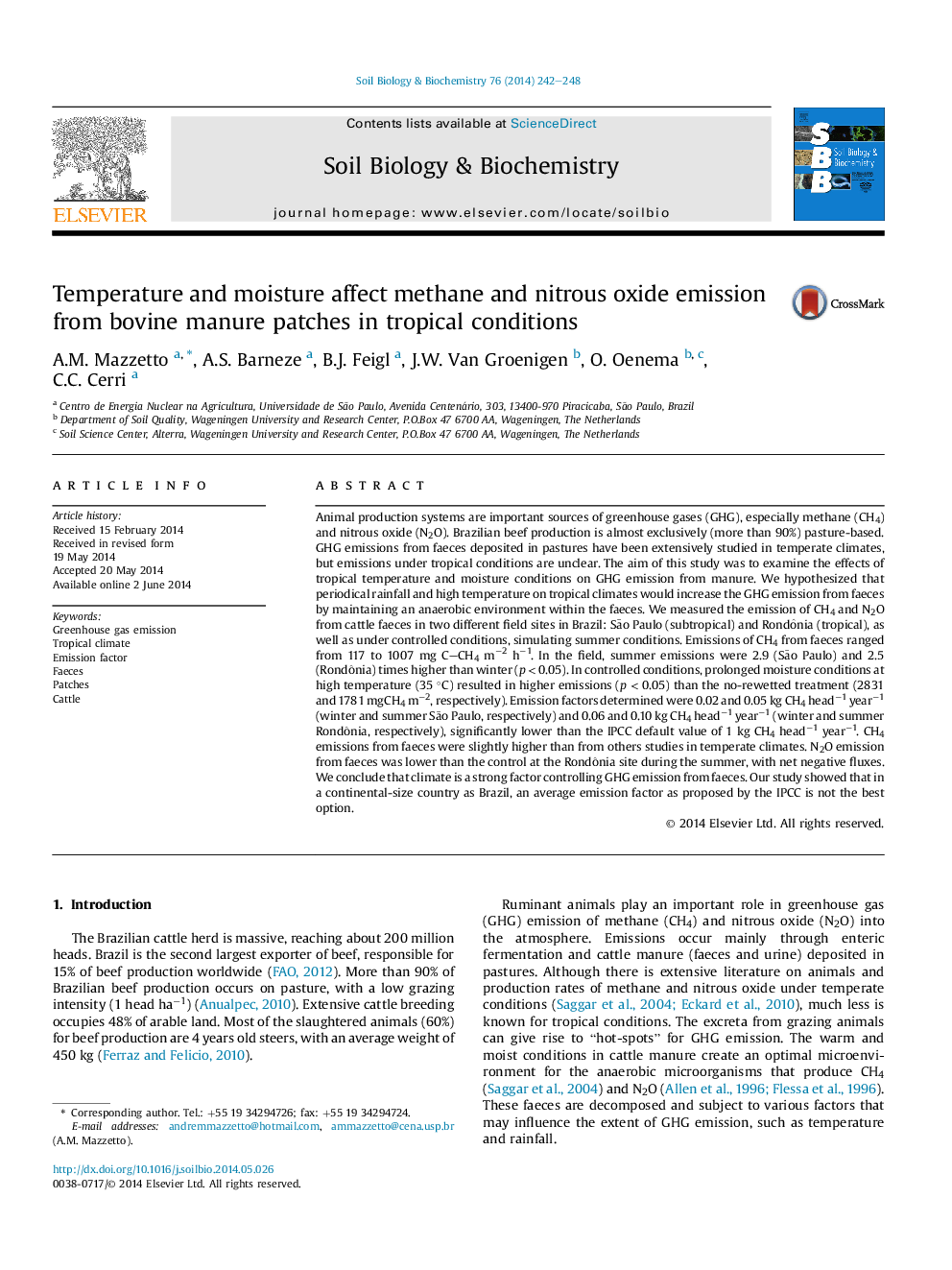| کد مقاله | کد نشریه | سال انتشار | مقاله انگلیسی | نسخه تمام متن |
|---|---|---|---|---|
| 8364667 | 1542608 | 2014 | 7 صفحه PDF | دانلود رایگان |
عنوان انگلیسی مقاله ISI
Temperature and moisture affect methane and nitrous oxide emission from bovine manure patches in tropical conditions
ترجمه فارسی عنوان
دما و رطوبت باعث انتشار گازهای متان و اکسید نیتروژن از تکه های کود گاو در شرایط گرمسیری می شوند
دانلود مقاله + سفارش ترجمه
دانلود مقاله ISI انگلیسی
رایگان برای ایرانیان
کلمات کلیدی
انتشار گازهای گلخانه ای، آب و هوای استوایی، فاکتور انتشار، فاکتور پچ ها، گاو،
موضوعات مرتبط
علوم زیستی و بیوفناوری
علوم کشاورزی و بیولوژیک
دانش خاک شناسی
چکیده انگلیسی
Animal production systems are important sources of greenhouse gases (GHG), especially methane (CH4) and nitrous oxide (N2O). Brazilian beef production is almost exclusively (more than 90%) pasture-based. GHG emissions from faeces deposited in pastures have been extensively studied in temperate climates, but emissions under tropical conditions are unclear. The aim of this study was to examine the effects of tropical temperature and moisture conditions on GHG emission from manure. We hypothesized that periodical rainfall and high temperature on tropical climates would increase the GHG emission from faeces by maintaining an anaerobic environment within the faeces. We measured the emission of CH4 and N2O from cattle faeces in two different field sites in Brazil: São Paulo (subtropical) and Rondônia (tropical), as well as under controlled conditions, simulating summer conditions. Emissions of CH4 from faeces ranged from 117 to 1007 mg C-CH4 mâ2 hâ1. In the field, summer emissions were 2.9 (São Paulo) and 2.5 (Rondônia) times higher than winter (p < 0.05). In controlled conditions, prolonged moisture conditions at high temperature (35 °C) resulted in higher emissions (p < 0.05) than the no-rewetted treatment (2831 and 1781 mgCH4 mâ2, respectively). Emission factors determined were 0.02 and 0.05 kg CH4 headâ1 yearâ1 (winter and summer São Paulo, respectively) and 0.06 and 0.10 kg CH4 headâ1 yearâ1 (winter and summer Rondônia, respectively), significantly lower than the IPCC default value of 1 kg CH4 headâ1 yearâ1. CH4 emissions from faeces were slightly higher than from others studies in temperate climates. N2O emission from faeces was lower than the control at the Rondônia site during the summer, with net negative fluxes. We conclude that climate is a strong factor controlling GHG emission from faeces. Our study showed that in a continental-size country as Brazil, an average emission factor as proposed by the IPCC is not the best option.
ناشر
Database: Elsevier - ScienceDirect (ساینس دایرکت)
Journal: Soil Biology and Biochemistry - Volume 76, September 2014, Pages 242-248
Journal: Soil Biology and Biochemistry - Volume 76, September 2014, Pages 242-248
نویسندگان
A.M. Mazzetto, A.S. Barneze, B.J. Feigl, J.W. Van Groenigen, O. Oenema, C.C. Cerri,
